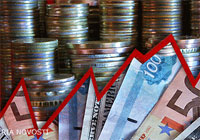Ukraine Shrugged Off as Russia ETF Swells to Record

(Bloomberg – bloomberg.com – Elena Popina – November 24, 2014) As oil fell into a bear market, the ruble traded at record lows and NATO said President Vladimir Putin is stoking conflict in Ukraine, bets on the biggest exchange-traded fund tracking Russian stocks surged to a record.
Demand for shares in the Market Vectors Russia ETF has held up as investors look beyond the Ukraine conflict and position themselves for a rebound in stocks trading at the cheapest valuations in emerging markets. Investors began piling in about four months ago amid signs the crisis was moving toward a resolution, easing concern that the U.S. and its allies, who say Russia’s helping rebels in the former Soviet republic, may toughen sanctions that have pushed the economy toward a recession.
“The decline in oil and a plunge in the ruble can’t be permanent, and at a time when U.S. stocks are at a record high, investors are getting interested in cheap Russian assets,” Sergei Pigarev, an analyst at Rye, Man & Gor Securities in Moscow, said by e-mail on Nov. 21. “There is a chance of double dipping: investors may cash in on the gains in the Russian market and get additional profit when the ruble strengthens.”
The number of outstanding shares in the U.S.-traded ETF has surged 67 percent since early August to 99.3 million, the most since the fund’s inception in 2007. The fund swelled even as the share price fell 10 percent during the same period on concern Russia’s slowing economy will crimp corporate profits. Economists surveyed by Bloomberg forecast that gross domestic product will expand 0.3 percent this year, the weakest since a recession in 2009.
‘Bearishness Fatigue’
While the ruble fell to a record low of 47.1735 per dollar on Nov. 14, it rallied 3.2 percent in the five days through Nov. 21, reducing its loss in 2014 to 28 percent. Brent crude rose 1.2 percent to $80.36 a barrel, posting its first weekly gain since September.
The ruble has strengthened since central bank Governor Elvira Nabiullina capped the cash available through its swap operations on Nov. 10 in a move to stop speculators from spurring further drops in the currency.
“Investors are showing less appetite to be aggressively bearish on the ruble as the oil plunge became less severe and investors saw that the central bank didn’t panic when the ruble plunged as everyone expected,” Benoit Anne, head of emerging-markets strategy at Societe Generale SA, said by phone on Nov. 21. “There is some bearishness fatigue and geopolitical crisis fatigue. The security situation might continue to be severe on the ground, but its market-moving power is becoming less important.”
‘Universally Hated’
The ruble-denominated Micex Index jumped 2.5 percent to 1538.93 last week, the highest level since February 2013. It trades at 5 times projected 12-month earnings, the cheapest among emerging-market equity benchmarks, data compiled by Bloomberg show. Moscow-based United Co. Rusal jumped 3.6 percent to HK$6.02 at 1:31 p.m. in Hong Kong, heading for the highest close since March 13, 2012.
The Bloomberg-Russia-US Equity Index gained 3.4 percent to 72.20 last week in its biggest weekly advance since September. Market Vectors Russia ETF (RSX) gained 3.6 percent in its biggest weekly advance in 11 weeks. The fund is still down 26 percent this year.
Traders added $54.4 million to the ETF in the week ended Nov. 21. The fund has posted inflows in 14 of the past 15 weeks, bringing the total injected since August to $913.4 million, data compiled by Bloomberg show.
GDP Slowdown
“There is a bet that the dollar strengthening toward the ruble won’t last forever, and certainly won’t strengthen at the pace it did in the fall, and there is a bet Russia will have to engage in dialog with the West as the impact of sanctions can’t be denied any longer,” Aleksei Belkin, who helps manage about $4 billion at Moscow-based Kapital Asset Management LLC, said by phone on Nov. 21. “The market is cheap and universally hated, investors are buying in hopes it will rise.”
Investors pulled $177.3 million out of Russia-dedicated equity funds in the week through Nov. 19 in the biggest outflow in almost four months,Cameron Brandt, research director at EPFR Global, a Cambridge, Massachusetts-based company that tracks fund flows, said by e-mail Nov. 21. The sentiment was driven by oil prices, developments in Ukraine and ruble weakness, he said.
International sanctions including financing restrictions have locked some of Russia’s biggest companies out of debt markets in the U.S. and Europe. While the average estimate of economists surveyed by Bloomberg is for 0.5 percent growth in GDP next year, Banks including JPMorgan Chase & Co., Morgan Stanley and Barclays Plc forecast a recession.
The Ukraine conflict has intensified since rebels in the breakaway regions of Donetsk and Luhansk held elections this month. Russia shelled Ukrainian territory for the first time since a Sept. 5 cease-fire agreement was signed, military spokesman Andriy Lysenko said in Kiev on Nov. 21. Putin, who on Nov. 17 warned that he won’t allow the rebels to be defeated by government forces, denies involvement in the conflict.
“The more profound this financial hunger is, the higher the hopes are that dialog will start sooner rather than later,” Belkin said. “That’s what investors want.”
Article ©2014 Bloomberg L.P. All Rights Reserved. Article also appeared at bloomberg.com/news/2014-11-23/ukraine-shrugged-off-as-russia-etf-swells-to-record.html
